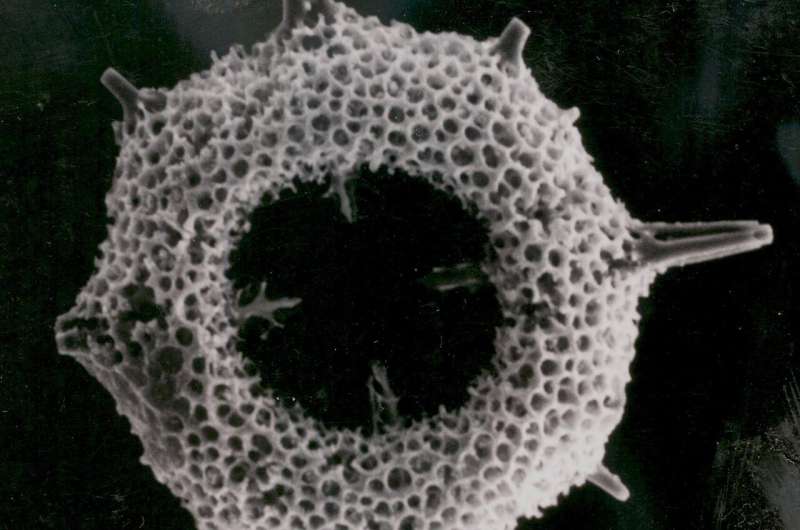#Innovative plankton monitoring tool holds key to assessing health of ocean life

“#Innovative plankton monitoring tool holds key to assessing health of ocean life”

Researchers from the University of Plymouth have helped to create a free, online tool to make complex plankton datasets easier and more accessible for all.
The Plankton Lifeform Extraction Tool (PLET) brings together separate plankton datasets into one central database and formats the data into pre-defined lifeforms, making it easier for marine biologists to access robust, reliable plankton data.
This data will give a more accurate picture of the spatial and temporal location of ocean plankton and in turn provide data and critical information to inform policy, public interest and scientific discovery.
The online tool, hosted by the Archive for Marine Species and Habitats Data (DASSH) was developed by researchers from 15 partners across Europe.
Dr. Abigail McQuatters-Gollop, Associate Professor of Marine Conservation at the University of Plymouth, worked on the project along with former postdoctoral researcher Dr. Jacob Bedford. She says that “we are fortunate in the UK to have so many consistent plankton time-series. Because PLET allows us to interpret these data holistically for the first time, we can now provide increasingly robust evidence for policy makers to make decisions. Maintaining these datasets is key to progressing our understanding of plankton change and managing our seas sustainably.”
“Learning about overfishing, coral bleaching, climate change—those human pressures—showed me I actually need to understand people and connect them together”
Lead author Dr. Clare Ostle, from the Marine Biological Association, says that “this has been many years in the making, and it’s great to see it come together. Plankton underpin so many important processes in the marine world, and making that data more user-friendly and accessible is key to answering important questions.”
Plankton form the base of the marine food web, help to regulate the ocean chemistry and provide approximately half of the world’s oxygen.
Because plankton have short life cycles, drift freely in the ocean and have wide distributions, they are sensitive indicators to climate change, and therefore play an important role for scientists monitoring changes in ocean biodiversity.
Although there are a number of programs that monitor plankton, the lack of direct comparison between datasets means that assessing plankton changes has been difficult and limited.
The PLET organizes European plankton datasets into functional groups—’lifeforms’ based on shared biological traits. By arranging this data into lifeform groupings, more can be learnt about the health of marine ecosystems.
Dr. Mike Best from The Environment Agency says that “having data from so many organizations in one place allows us to accurately access the health of the plankton in our seas and take appropriate actions to protect and preserve the food webs they sustain.”
The PLET was built by the Marine Biological Association, the University of Plymouth and Plymouth Marine Laboratory (now working in partnership as Marine Research Plymouth), and 13 other universities and research institutes across the UK and Europe.
Currently, PLET is used in the North East Atlantic and North Sea but the research team hope that the free and easily accessible tool will encourage marine biologists all over the world to input and access data.
The PLET currently holds 155,000 samples containing over 44 million plankton records collected across Europe between 1924 and 2017. The longest time series dataset was collected from the Marine Biological Associations’ Young Fish Trawl survey starting in 1924.
Project co-ordinator for DASSH Dan Lear says that “drawing on the expertise and unique infrastructure that the MBA has developed as a MEDIN Data Archive Centre and UK node of OBIS; we have been able to deliver a scalable and robust toolset to support informed policy making.”
The research was published in Earth System Science Data.
Study shows six decades of change in plankton communities
Clare Ostle et al, The Plankton Lifeform Extraction Tool: a digital tool to increase the discoverability and usability of plankton time-series data, Earth System Science Data (2021). DOI: 10.5194/essd-13-5617-2021
Tool: www.dassh.ac.uk/lifeforms/
Citation:
Innovative plankton monitoring tool holds key to assessing health of ocean life (2021, December 7)
retrieved 7 December 2021
from https://phys.org/news/2021-12-plankton-tool-key-health-ocean.html
This document is subject to copyright. Apart from any fair dealing for the purpose of private study or research, no
part may be reproduced without the written permission. The content is provided for information purposes only.
If you liked the article, do not forget to share it with your friends. Follow us on Google News too, click on the star and choose us from your favorites.
For forums sites go to Forum.BuradaBiliyorum.Com
If you want to read more Like this articles, you can visit our Science category.



